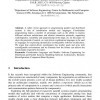Free Online Productivity Tools
i2Speak
i2Symbol
i2OCR
iTex2Img
iWeb2Print
iWeb2Shot
i2Type
iPdf2Split
iPdf2Merge
i2Bopomofo
i2Arabic
i2Style
i2Image
i2PDF
iLatex2Rtf
Sci2ools
113
click to vote
HPCN
2000
Springer
2000
Springer
Dynamic Reconfiguration in Coordination Languages
A rather recent approach in programming parallel and distributed systems is that of coordination models and languages. Coordination programming enjoys a number of advantages such as the ability to express t software architectures and abstract interaction protocols, supporting multilinguality, reusability and programming-in-the-large, etc. In this paper we show the potential of control- or event-driven coordination languages to be used as languages for expressing dynamically reconfigurable software architectures. We argue that control-driven coordination has similar goals and aims with reconfigurable environments and we illustrate how the former can achieve the functionality required by the latter.
Coordination Models | Distributed And Parallel Computing | Event-driven Coordination Languages | HPCN 2000 | Software Architectures |
Related Content
| Added | 24 Aug 2010 |
| Updated | 24 Aug 2010 |
| Type | Conference |
| Year | 2000 |
| Where | HPCN |
| Authors | George A. Papadopoulos, Farhad Arbab |
Comments (0)

